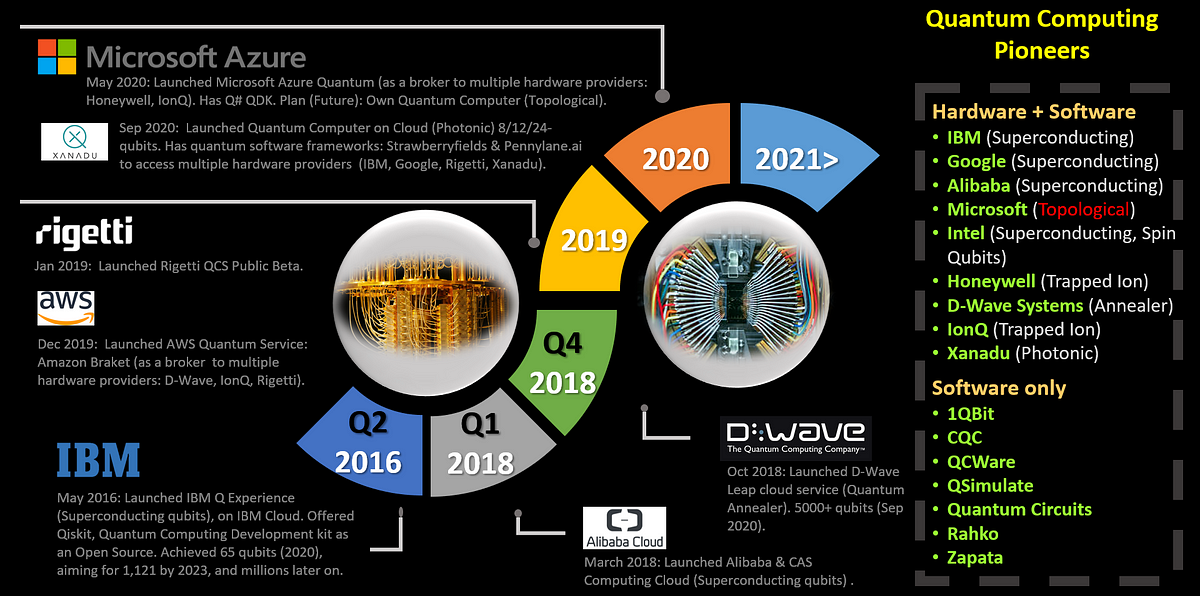With the rapid advancements in technology, we stand on the brink of a new era where quantum computing meets the internet. This marriage of two groundbreaking technologies has the potential to revolutionize various sectors, from data security to scientific research. In this blog post, we explore the potentials of quantum computing and its implications for the internet, envisioning a future where these technologies complement each other seamlessly.
Quantum Computing: Unleashing Computing Power at Unprecedented Levels
Briefly defining quantum computing:
Quantum computing is a branch of computing that utilizes the principles of quantum mechanics to perform computations at speeds far beyond the capabilities of classical computers. Instead of relying on traditional bits to represent information, quantum computers use quantum bits, or qubits. These qubits can exist in multiple states simultaneously, thanks to the phenomenon known as superposition.
The power of superposition and entanglement:
In classical computing, bits are limited to representing either a 0 or a 1. However, qubits can exist in multiple states simultaneously due to superposition. This attribute allows quantum computers to process and analyze vast amounts of data concurrently, leading to exponential computational power.
Examples of quantum computing applications today:
Although still in its early stages, quantum computing has shown promise in various fields. One notable application is quantum simulation, where researchers simulate and study complex quantum systems beyond the capabilities of classical computers. Quantum optimization is another impactful application, with potential uses in logistics, financial modeling, and portfolio optimization.
Challenges and roadmaps:
While quantum computing holds immense potential, there are significant challenges that need to be overcome before achieving widespread adoption. One significant challenge is the need for error correction due to the inherent instability and sensitivity of qubits. Researchers are actively exploring techniques to mitigate errors and improve qubit performance. Additionally, quantum computers are currently expensive to build and maintain, making accessibility a barrier for some industries and researchers. However, as technology progresses, quantum computing is poised to become more feasible and accessible.
Quantum Networking: Enhancing the Internet Infrastructure
Current limitations of classical internet architecture:
The current internet infrastructure is built on classical computing principles, which poses security vulnerabilities. Encryption algorithms that secure data transmission could be compromised by the immense computational power of future quantum computers. Furthermore, as more critical infrastructure relies on internet connectivity, ensuring secure and reliable communication becomes crucial.
Quantum networking: Building an ultra-secure internet:
Quantum networking harnesses the principles of quantum mechanics to develop a secure and robust internet infrastructure. One of the key components of quantum networking is quantum key distribution (QKD). Through QKD, cryptographic keys are exchanged using quantum principles, ensuring secure communication even if intercepted by malicious actors.
Quantum key distribution (QKD): Essentially unbreakable encryption:
QKD provides a quantum-driven solution for encryption. By leveraging the properties of quantum mechanics, it enables the exchange of cryptographic keys that are essentially unbreakable using conventional computing methods. Any attempt to eavesdrop on the communication between sender and receiver would cause a disturbance, alerting both parties to a potential security breach.
Quantum teleportation: A leap towards quantum internet:
Quantum teleportation is a concept that allows the transfer of quantum states between distant qubits. While not teleporting physical matter, quantum teleportation holds the key to establishing a quantum internet, where information can be instantaneously transmitted across vast distances.
Quantum internet prototypes and ongoing research efforts:
Researchers worldwide are actively working on developing prototypes of quantum networks. Various experiments have successfully demonstrated elements of quantum networking, such as long-distance entanglement distribution and secure communication. Ongoing research efforts seek to address scalability and efficiency challenges to pave the way for a fully operational quantum internet.
Quantum Machine Learning: Revolutionizing Data Analysis
Conventional machine learning algorithms vs. quantum machine learning:

Image courtesy of via Google Images
Machine learning algorithms have revolutionized data analysis, enabling insights and predictions from vast amounts of structured and unstructured data. Quantum machine learning (QML) takes this one step further, leveraging the computational power of qubits to accelerate data analysis and optimization tasks.
Quantum computing’s potential to accelerate data analysis:
Quantum computers have the potential to exponentially speed up linear algebraic operations, which form the basis of various machine learning algorithms. This capability can significantly reduce the computational burden when processing large datasets, enabling faster and more accurate results.
Quantum neural networks: Optimizing deep learning tasks:
Deep learning is a complex branch of machine learning that relies on neural networks with many layers. Quantum neural networks leverage quantum computing to optimize the training and inference processes, unlocking the potential for solving even more complex problems in areas such as image recognition or natural language processing.
Quantum machine learning applications in different industries:
The integration of quantum computing and machine learning has implications in various industries. For example, in healthcare, it can enable more accurate disease diagnosis and drug discovery. In finance, it can improve asset pricing models and risk assessment. The potential applications span across sectors, showcasing the far-reaching impact of quantum-enhanced machine learning.
Ethical implications and challenges surrounding quantum machine learning:
As with any transformative technology, quantum machine learning brings ethical challenges. Issues like data privacy, bias in algorithms, and the impact on workforce dynamics require careful considerations. The development of ethical frameworks and continuous dialogue among stakeholders is essential to ensure responsible utilization and deployment of quantum machine learning solutions.
Quantum-Based Cryptography: Fortifying Cybersecurity
Classical cryptography vulnerabilities in the digital age:
The rise of computing power has rendered some classical cryptographic algorithms vulnerable to brute-force attacks. As computational power continues to advance, conventional encryption methods may soon no longer provide sufficient protection for sensitive information.
Quantum-resistant algorithms: Bolstering data protection:
Quantum-resistant cryptography aims to design and implement algorithms that can withstand attacks from both classical and quantum computers. By leveraging mathematical principles and cryptographic techniques resistant to quantum algorithms, sensitive data can be secured against malicious attacks.
Post-quantum cryptography: Preparing for quantum computing’s threat:
Post-quantum cryptography focuses on developing encryption methods that can resist attacks from quantum computers. Researchers are actively exploring lattice-based, code-based, and other post-quantum cryptographic algorithms to ensure long-term security for sensitive data.
Quantum-safe communication standards: Anticipating a quantum-driven future:
To combat the threat of powerful quantum computers, global organizations are working on developing quantum-safe communication standards. The aim is to establish protocols that enable secure communication even when quantum computing becomes mainstream, ensuring data protection in the future.
Collaboration between the cryptographic community and quantum computing experts:
Solving the challenges of quantum-resistant cryptography requires collaboration between experts in the field of cryptography and quantum computing. By collectively addressing the challenges and sharing knowledge, robust solutions can be developed and implemented to secure our digital infrastructure.
Quantum Computing and Scientific Discovery
Simulation of complex and large-scale quantum systems:

Image courtesy of via Google Images
Quantum computers have the potential to simulate and study complex quantum systems that are beyond the reach of classical computers. This capability can revolutionize the fields of chemistry, material science, and even climate modeling, enabling scientists to gain deeper insights into these systems.
Accelerating computational drug discovery and material science:
Quantum computing can expedite the process of drug discovery by simulating molecular interactions and predicting the effectiveness of potential drug candidates. Similarly, in material science, quantum computers can help design new materials with desired properties, revolutionizing industries such as renewable energy and electronics.
Quantum gravity: Bridging the gap between quantum mechanics and general relativity:
Understanding the nature of the universe requires merging the principles of quantum mechanics and general relativity. Quantum computing has the potential to contribute to this effort by simulating and exploring the properties of quantum gravity, potentially unlocking the mysteries of black holes and the origins of the universe.
Challenges: Scaling quantum computing to tackle scientific research:
While quantum computing shows promise in scientific research, scalability remains a significant challenge. The complexity and expense of building and maintaining large-scale quantum computers pose obstacles to leveraging quantum technology for groundbreaking scientific discoveries. However, ongoing advancements and collaborations aim to overcome these challenges.
Collaborations between academia, industry, and quantum computing pioneers:
Scientific research often requires interdisciplinary collaboration. Academia, industry leaders, and quantum computing pioneers are joining forces to accelerate the development of quantum computing technology and its applications in scientific research. These partnerships foster innovation and drive the exploration of new frontiers in various scientific disciplines.
In Conclusion
As quantum computing and the internet continue to evolve, the possibilities for transformational change are endless. The combination of these two cutting-edge technologies is paving the way for a future where data security, computational power, and scientific discovery reach unparalleled heights. However, while we are still in the early stages of exploration, the race to unlock the full potential of quantum computing and integrate it seamlessly into the fabric of the internet has already begun. Buckle up as we embark on this extraordinary journey into the next technological leap.



